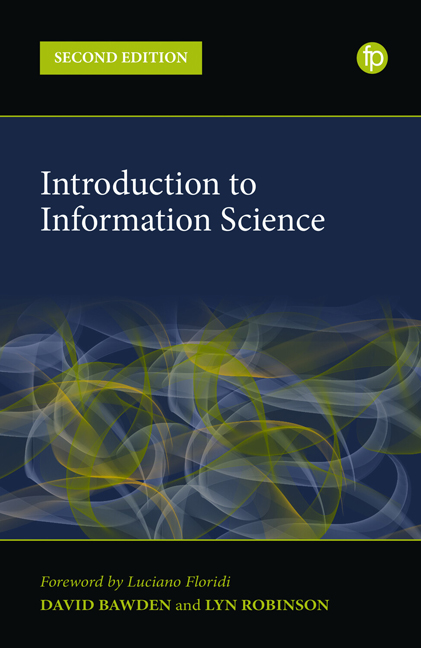Book contents
- Frontmatter
- Contents
- Figures
- Preface
- Foreword – Curators of Semantic Capital
- List of Acronyms
- 1 The Information Science Discipline
- 2 History of Information: the Story of Documents
- 3 Philosophies of Information
- 4 Paradigms, Turns and Theories in the Information Sciences
- 5 Information
- 6 Documents and Documentation
- 7 Domain Analysis
- 8 Information Organisation
- 9 Digital Technologies and Data Systems
- 10 Information Systems
- 11 Informetrics
- 12 Information Behaviour
- 13 Communicating Information: Changing Contexts
- 14 Information Management and Policy
- 15 Information Law and Ethics
- 16 Information Society
- 17 Digital (Onlife) Literacies
- 18 Research in the Information Sciences
- 19 The Future of the Information Sciences
- Additional Resources
- Index
12 - Information Behaviour
Published online by Cambridge University Press: 21 April 2022
- Frontmatter
- Contents
- Figures
- Preface
- Foreword – Curators of Semantic Capital
- List of Acronyms
- 1 The Information Science Discipline
- 2 History of Information: the Story of Documents
- 3 Philosophies of Information
- 4 Paradigms, Turns and Theories in the Information Sciences
- 5 Information
- 6 Documents and Documentation
- 7 Domain Analysis
- 8 Information Organisation
- 9 Digital Technologies and Data Systems
- 10 Information Systems
- 11 Informetrics
- 12 Information Behaviour
- 13 Communicating Information: Changing Contexts
- 14 Information Management and Policy
- 15 Information Law and Ethics
- 16 Information Society
- 17 Digital (Onlife) Literacies
- 18 Research in the Information Sciences
- 19 The Future of the Information Sciences
- Additional Resources
- Index
Summary
One thing we know now … is that underlying human propensities with regard to information emerge again and again, as each new technology becomes familiar and its use second nature.
Marcia Bates (2010, 2385)All people are individuals and will seek and use information in different ways … [information gathering] is an integral part of our personalities, and we all do it differently. There is no such thing as a homogeneous body of information users.
Maurice Line (1998, 223)It can be seen that information behavior research has developed along multiple lines, and maintained its popularity. The field still retains themes, theories, and methodologies from half a century ago, and a few of these older approaches remain useful. At the same time it has embraced new perspectives, theories, and methods that would have been considered highly unusual.
Donald Case and Lisa M. Given (2016, 365)Introduction
Information behaviour, the ways in which it is studied, and the significance for practice of the results of such studies, are central topics within information science. Without reliable knowledge of the way in which people find and use information, provision of effective services can be based only on guesswork and assumptions.
This has been a popular area within information research and one of the richest for the creation of concepts, models and frameworks to explain the complex data produced, and this chapter can only provide an overview. For more in-depth treatment of all aspects, see Case and Given (2016) and Ford (2015); for a broad approach showing the overlap of information behaviour with information literacy and with HCI, see St Jean, Gorham and Bonsignore (2021); and for a review of information behaviour in the specific context of health, see Zimmerman and Shaw (2020). We will first examine the origins and development of information behaviour studies, with a summary of changing research methods. A summary of information behaviour concepts and a selective mention of significant models and theories follows. The chapter concludes with examples of studies of the information behaviour of different groups and the idea of individual styles of information behaviour.
Origins and development of information behaviour studies
Information behaviour studies have a long history (Case, 2006; 2014; Wilson, 1994; 2008). A specific concern for users of information has been evident from the earliest days of the information professions.
- Type
- Chapter
- Information
- Introduction to Information Science , pp. 227 - 248Publisher: FacetPrint publication year: 2022

